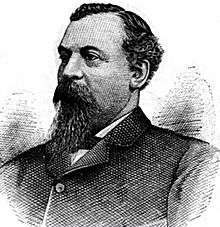John Paul Sr. (judge)
| John Paul Sr. | |
|---|---|
 | |
| Judge of the United States District Court for the Western District of Virginia | |
|
In office September 5, 1883 – November 1, 1901 | |
| Appointed by | Chester Arthur |
| Preceded by | Alexander Rives |
| Succeeded by | Henry C. McDowell Jr. |
| Member of the U.S. House of Representatives from Virginia's 7th district | |
|
In office March 4, 1881 – September 5, 1883 | |
| Preceded by | John T. Harris |
| Succeeded by | Charles Triplett O'Ferrall |
| Member of the Virginia Senate from Rockingham County | |
|
In office 1878–1881 | |
| Preceded by | District established |
| Succeeded by | Joseph B. Webb |
| Personal details | |
| Born |
June 30, 1839 Ottobine, Virginia |
| Died |
November 1, 1901 (aged 62) Harrisonburg, Virginia |
| Political party | Readjuster (after 1881) |
| Other political affiliations |
Democrat (before 1880) Republican (1880–1881) |
| Alma mater | University of Virginia |
| Occupation | Attorney |
| Military service | |
| Allegiance | Confederate States of America |
| Service/branch | Confederate Army |
| Rank | captain |
| Unit | 1st Virginia Cavalry |
| Battles/wars | American Civil War |
John Paul (June 30, 1839 – November 1, 1901) was a U.S. Representative and federal judge from Virginia.[1][2]
Early and family life
Born June 30, 1839 in Rockingham County, Virginia at Ottobine on June 30, 1839 to Peter Paul (1812-1878]] and his wife the former Maria Whitmore (1812-1903), John Paul had an older sister Kate (1837-1905) and had three younger brothers and three sisters who survived to adulthood. He attended the local schools. He had begun studies at Roanoke College when the American Civil War began and the Virginia declared its secession. After the war, Paul studied law at the University of Virginia, and graduated in 1867.
He married Katherine Seymour Green (1847-1927) on November 19, 1874. They had three sons and three daughters who survived them, although their first son, John Rockingham Paul (1877-1879) did not survive infancy. Their son John Paul, also became a U.S. congressman for Virginia's 7th district and federal judge for the Western District of Virginia.
Confederate officer
During the Civil War, John Paul entered the Confederate States Army and became a captain in the 1st Virginia Cavalry.
Legal, legislative and judicial career
Paul was admitted to the bar in 1867 and commenced practice in Harrisonburg. He served as the Commonwealth's attorney for Rockingham County from 1870 to 1877.
After restoration of civil rights to Confederate veterans, Paul won election to represent Rockingham County in the Virginia Senate, and served one term in that part-time position, from 1877 to 1880. In 1878 he ran unsuccessfully for a seat in the Forty-sixth Congress.
John Paul defeated both Republican and Democratic opponents to win election as a Readjuster Democrat to the Forty-seventh Congress (March 4, 1881 – March 3, 1883), succeeding John T. Harris. He appeared to win re-election and served from March 4, 1883, until September 5, 1883, when he resigned to take his judicial position. The seemingly losing candidate, Democrat Charles Triplett O'Ferrall, was ultimately determined the victor in the 1882 campaign after demanding a re-count, and won re-election several times before resigning to run for Governor of Virginia (and winning in 1893).
President Chester A. Arthur nominated John Paul to become judge of the United States District Court for the Western District of Virginia and after confirmation by the Senate, he filled the seat vacated by Alexander Rives.
Death and legacy
He served as federal judge from September 5, 1883, until his death in Harrisonburg, Virginia, on November 1, 1901. Judge Paul dedicated a new courthouse in Harrisonburg in 1896, and delivered a carefully prepared historical address concerning the local bar.[3] Judge John Paul was survived by his widow and six children, and interred in Woodbine Cemetery.[4] President Theodore Roosevelt appointed Henry C. McDowell Jr., who succeeded Judge Paul after confirmation by the Senate. Although the Readjuster Party did not survive into the 20th Century, the U.S. Supreme Court eventually agreed with part of its platform and allocated part of Virginia's pre-Civil War debt to what became West Virginia in that war.
His son, John Paul Jr., also became a lawyer, and served as U.S. Representative and judge of the United States District Court for the Western District of Virginia. He donated part of the family's farm in Ottobine, Virginia to become the Paul State Forest.
Electoral history
- 1880; Paul was elected to the U.S. House of Representatives with 49.3% of the vote, defeating Democrat Henry C. Allen (Virginia) and Republican William C. Moseley.
- 1882; Paul appeared re-elected with 50.2% of the vote, defeating Democrat Charles T. O'Ferrall (who was later declared the winner) and Republican James W. Cochran.
References
| U.S. House of Representatives | ||
|---|---|---|
| Preceded by John T. Harris |
Member of the U.S. House of Representatives from Virginia's 7th congressional district 1881–1883 |
Succeeded by Charles Triplett O'Ferrall |
| Legal offices | ||
| Preceded by Alexander Rives |
Judge of the United States District Court for the Western District of Virginia 1883–1901 |
Succeeded by Henry C. McDowell Jr. |
![]()